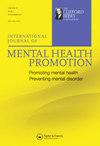心理弹性的个人因素:成人心理弹性问卷的编制与验证
IF 1.4
4区 医学
Q4 PSYCHIATRY
International Journal of Mental Health Promotion
Pub Date : 2017-03-01
DOI:10.1080/14623730.2017.1297248
引用次数: 10
摘要
摘要重大不良事件后的恢复力结果与某些个人属性有关,称为恢复力因素。这项研究旨在将针对儿童和青少年开发的Embury王子弹性模型应用于成年人群。为此,制定了成人弹性问卷(RQA),由九个特征组成,围绕三个因素组织:掌握感、关联感和情绪反应性。通过可靠性、验证性因素、交叉验证和多组分析,在来自普通人群和健康问题人群(N=430)的成年人中测试了问卷的充分性。通过潜在变量的路径分析评估标准有效性,以预测恢复力结果。RQA评分是可靠的,三因素模型与数据拟合良好。三个弹性因素预测了弹性变化的三分之二。这份问卷是对弹性背后的个人因素的可靠和有效的评估。本文章由计算机程序翻译,如有差异,请以英文原文为准。
Personal factors underlying resilience: development and validation of the Resiliency Questionnaire for Adults
Abstract Resilience outcomes following significant adverse events are related to certain personal attributes, termed resiliency factors. This study aimed to adapt the Prince-Embury resiliency model, developed with children and adolescents, to adult populations. To that end, the Resiliency Questionnaire for Adults (RQA) was developed, consisting of nine characteristics organised around three factors: Sense of Mastery, Sense of Relatedness and Emotional Reactivity. The questionnaire adequacy was tested in adults from both general and health-distressed populations (N = 430) through reliability, confirmatory factor, cross-validation and multiple-group analyses. Criterion validity was assessed via path analysis with latent variables to predict resilience outcomes. The RQA scores were reliable and the three-factor model fitted the data well. The three resiliency factors predicted two-thirds of the variance in resilience. This questionnaire constitutes a reliable and valid assessment of personal factors underlying resilience.
求助全文
通过发布文献求助,成功后即可免费获取论文全文。
去求助
来源期刊
CiteScore
1.70
自引率
7.70%
发文量
52
期刊介绍:
This title has ceased (2018). The first journal of its kind in the field, IJMHP publishes materials of distinction, making it essential reading for those with a professional or personal interest in mental health promotion. IJMHP co-ordinates the dissemination of new research outcomes to all those involved in policy making and the implementation of mental health promotion and mental disorder prevention policies. This makes it indispensable to clinical/medical staff, health services researchers, managers, health promoters, educationalists, sociologists, health economists and practitioners from all branches of health and social care, publishing materials by and for all these communities. IJMHP is an official publication of the Clifford Beers Foundation, who work to promote mental health and prevent mental disorders through dissemination of knowledge, training partnerships and consultation. The journal is peer reviewed by an expert international board and acts as a comprehensive information resource designed to increase awareness, foster understanding and promote collaboration between the different disciplines engaged in this diverse activity of study.

 求助内容:
求助内容: 应助结果提醒方式:
应助结果提醒方式:


